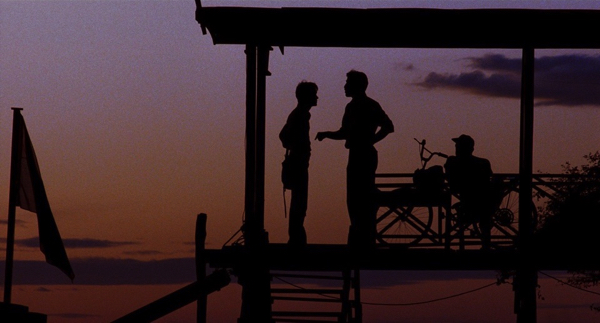
Dir.: Roland Joffé; Cast: Sam Waterston, Haing S. Ngor, John Malcovich, Julian Sands; UK 1984, 141′
British director Roland Joffé’s (*1945) debut feature is a triumph. Chris Menges’ documentary-style photography transports to the horror but also the era: Killing Fields is not just another heroic Vietnam War film like the Deerhunter.
Based on Sidney Schanberg’s biographical novel “The Death and Life of Dith Pran”, Bruce Robinson’s narrative begins in 1973 in Cambodia’s capital Phnom Penh. American journalist Sidney Schanberg (Waterston) and his Cambodian assistant and interpreter Dith Pran (Ngor) pick up on rumours that American bombers have destroyed the city of Neak Leung, the US war spilling over from Vietnam to Cambodia, and despite sanitised reports in the US press. they soon discover the extent of the carnage when they arrive in Neak Leung,
Two years later, the two are joined by photographer Al Rockoff (Malcovich), when the Khmer Rouge, having won the war, are entering Phnom Pennh. Rockoff assists in trying to forge a passport for Pran, but it all goes pear-shaped. Still, Schanberg is able to get Pran’s wife and four kids out of the country. Pran stays behind, in a tacit agreement with Schanberg, who wants to use him for stories about the Khmer Rouge’s brutal regime. Pran escapes the communist’s firing squad, knowing that intellectuals are the main target for execution, and playing the dumb peasant. One of the Khmer soldiers, Phat, is suspicious of him, and asks him to educate his son with some hair-raising moments, soon escaping with some other friends, a plan that leads to tragedy, Pran finally reaching Thailand, and re-uniting in the USA with Schanberg, who has had a time of it too but has garnered a Prize for his work. Schanberg, ashamed of himself, begs Pran to forgive him.
Dr. Haing S. Ngor won the Oscar for Best Supporting Actor: he had never acted in his life but gives a naturalistic performance because this is his story. Robinson plays a balancing act with his script, showing the mass executions of the Khmer Rouge, but also pointing the finger at the other warring nations. There are no heroes, just guilty men for different reasons. Joffé is something of an enigma: he would go on to direct The Mission, which won the Palme d’Or in 1986 at Cannes and a cinematography Oscar. His is one example of a career that has never since touched the zenith of its early success. AS
AMAZON PRIME | JULY 24 2020